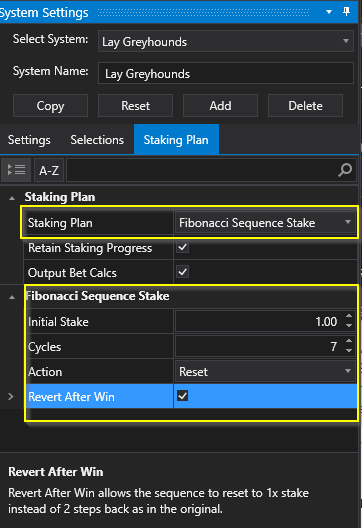Fibonacci Sequence Stake – Back and Lay
|
This staking plan is based on the Fibonacci sequence of numbers first devised by an Italian mathematician in the 12th century.
 Some people profess that the Fibonacci sequence can form the basis of a very efficient staking plan, especially when it comes to horse racing.
The Fibonacci sequence works by adding the two previous numbers in the Fibonacci Sequence to get the next stake, i.e. 1-2-3-5-8-13-21-34.
With the Fibonacci sequence your bets go up one step with each loss and you reduce your stake in the Fibonacci sequence down 2 steps with each win. Think of it like a multiplier stake, where the initial stake is multiplied by the sequence.
Note that every win with the Fibonacci sequence often pays for the two previous losses.
Worked example for the Fibonacci sequence assuming 7 cycles set:
Step1 - bet £10 until you lose, then bet £20
Step 2 - if you win at £20, then return to step 1. If you lose, then bet £30 (cycle 1)
Step 3 - if you win at £30, then return to step 1. If you lose, then bet £50 (cycle 2)
Step 4 - if you win at £50, then return to step 2. If you lose, then bet £80 (cycle 3)
Step 5 - if you win at £80, then return to step 3. If you lose, then bet £130 (cycle 4)
Step 6 - if you win at £130, then return to step 4. If you lose, then bet £210 (cycle 5)
Step 7 - if you win at £210, then return to step 5. If you lose, then bet £340 (cycle 6)
Step 8 - if you win at £340, then return to step 6. If you lose, return to step 1 (reset fib stake or stop the bot) (cycle 7)
Further with each step (also known as a cycle) if the number of cycles are met then you can choose to stop the bot or reset the stake and continue.
Revert After Win allows the sequence to reset to 1x stake instead of 2 steps back as in the original. This option may suit some strategies better.
|